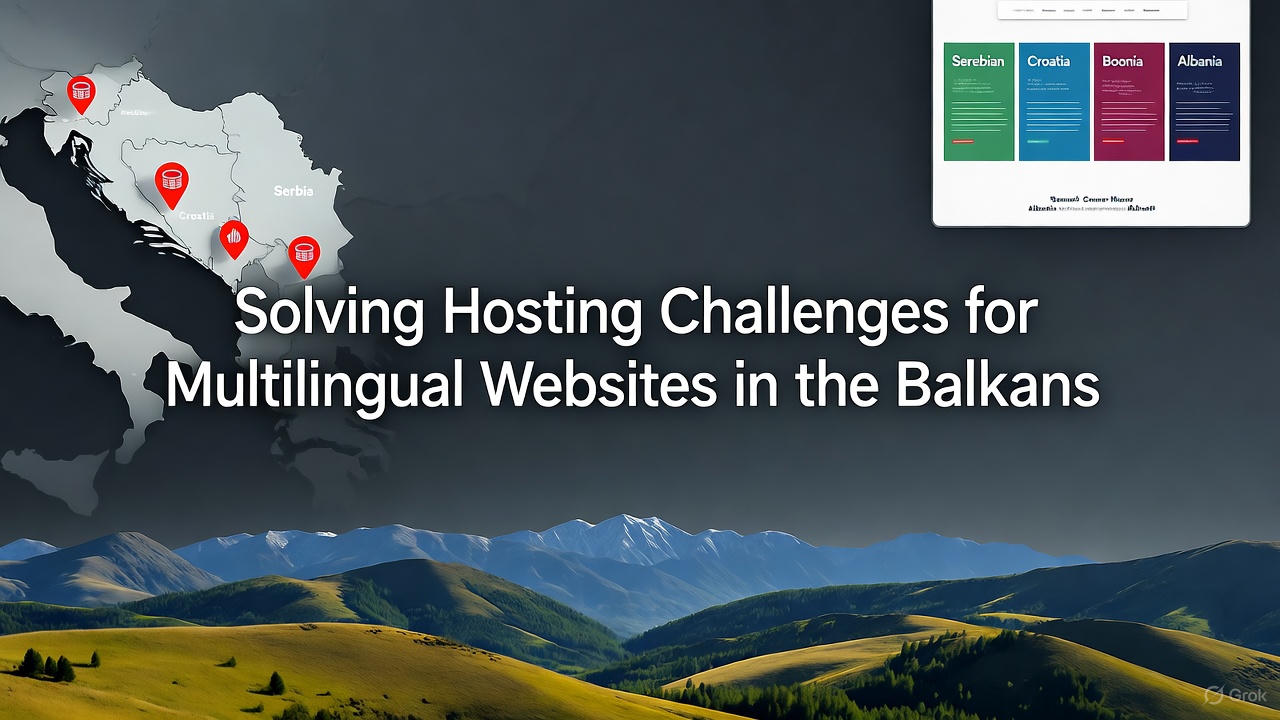
Solving Hosting Challenges for Multilingual Websites in the Balkans
The Balkans, a region rich in cultural diversity spanning countries like Albania, Serbia, Croatia, Bosnia and Herzegovina, and beyond, is home to over 20 languages and dialects. For businesses, tourism operators, and content creators building multilingual websites to serve this audience, hosting presents unique hurdles—from encoding issues with non-Latin scripts to ensuring low-latency access across borders. With internet penetration reaching 70-80% in urban areas by 2025, a poorly hosted site can mean lost opportunities in a market projected to grow 15% annually in digital commerce. This article breaks down the key hosting challenges for multilingual websites in the Balkans and offers practical solutions to ensure seamless performance, SEO success, and user satisfaction.
What Makes Hosting Multilingual Websites in the Balkans Unique?
Multilingual websites in the Balkans often need to support languages like Albanian, Serbian (Cyrillic/Latin), Croatian, Bosnian, and English, requiring robust infrastructure for right-to-left scripts (if including minority languages), cultural localization, and compliance with EU-adjacent regulations like GDPR. Unlike single-language sites, these demand hosting that handles dynamic content switching, fast regional loading, and scalable resources. Providers with data centers in Tirana, Belgrade, or Zagreb can minimize latency, while global CDNs ensure broader reach.
Key Challenges and Hosting Solutions for Multilingual Balkan Websites
1. Language Encoding and Script Support
Non-Latin scripts (e.g., Serbian Cyrillic) can cause display issues on servers without full Unicode (UTF-8) support, leading to garbled text or broken layouts. Solution: Choose hosting with native UTF-8 encoding and CMS compatibility like WordPress Multilingual or Joomla’s built-in tools. Balkan-focused providers like Albahost in Albania offer NVMe SSDs optimized for script-heavy sites, ensuring quick rendering.
2. Performance and Latency Across Borders
Users in remote areas like rural Bosnia or Montenegro face high ping times if servers are distant, impacting bounce rates by up to 32%. Solution: Opt for VPS or dedicated hosting in regional data centers (e.g., Tirana for Albania or Frankfurt for broader Balkans access). Hostinger’s European plans, with data centers near Serbia and Croatia, deliver <50ms latency, while integrating CDNs like Cloudflare caches localized content.
3. SEO and Hreflang Implementation
Search engines struggle with multilingual SEO without proper hreflang tags, especially in low-competition Balkan markets where local queries dominate. Solution: Use hosting with built-in SEO tools and subfolder structures (e.g., /sq/ for Albanian, /sr/ for Serbian). Providers like BeotelNet in Serbia support easy hreflang setup via cPanel, boosting visibility in Google Balkans—where multilingual sites see 20% higher rankings.
4. Content Management and Localization
Updating content across languages is cumbersome without integrated TMS (Translation Management Systems), leading to inconsistencies in branding. Solution: Select hosts compatible with HubSpot or WPML plugins for automated localization. In the Balkans, True-False Hosting in Serbia offers scalable VPS plans starting at €10/month, with one-click installs for multilingual CMS, streamlining updates for sites targeting Albania and Croatia.
5. Scalability for Seasonal Traffic Spikes
Tourism sites in Croatia or e-commerce in Bosnia see 3x traffic during summers, overwhelming shared hosting. Solution: Go for cloud or VPS hosting that auto-scales. Webdock’s Serbian-optimized VPS handles 100+ concurrent users with 99.99% uptime, ideal for fluctuating Balkan audiences.
6. Data Privacy and Regional Compliance
GDPR influences even non-EU Balkans, with fines for poor data handling on cross-border sites. Solution: Choose EU-compliant hosts like those in Croatia’s Plus Hosting, offering encrypted storage and audit logs. For Bosnia-based sites, local providers ensure sovereign data residency.
7. Cost Management in Emerging Markets
High-quality multilingual hosting can strain budgets in economies like Albania’s, where average SME spends are under €500/year. Solution: Affordable shared/VPS hybrids from Hostinger (€2-5/month) or local options like NSAlbania provide unlimited bandwidth without compromising on multilingual features.
8. User Experience and Cultural Adaptation
Varying text lengths (e.g., longer Serbian phrases) can break responsive designs if hosting doesn’t support flexible caching. Solution: Leverage hosts with edge caching and RTL support. Croatian providers like Tophost integrate seamlessly with adaptive themes, ensuring mobile-first UX for 60% Balkan mobile users.
9. Integration with Local Payment and Analytics
Balkan sites need gateways like local banks, but mismatched hosting can slow integrations. Solution: Hosts with API-friendly environments, such as BeotelNet’s Serbian servers, support Stripe/PayPal Balkan variants and Google Analytics multilingual tracking.
10. Backup and Recovery for Diverse Content
Syncing backups across languages risks data loss during migrations. Solution: Automated daily backups on VPS plans from Albahost ensure versioned restores, critical for Balkan sites with frequent localization updates.
Why Solving These Challenges Matters in the Balkans
The Balkans’ digital economy is booming, with e-commerce in Serbia and Croatia up 25% in 2025, but multilingual sites convert 2.5x better when hosted regionally. Ignoring these issues leads to 40% higher abandonment rates, per local SEO studies. Tailored hosting not only resolves technical pain points but also taps into cultural nuances, like seasonal festivals driving traffic in Bosnia.
How to Choose Hosting for Multilingual Websites in the Balkans
- Regional Focus: Prioritize providers with Balkan data centers (e.g., Tirana, Belgrade) for <100ms latency.
- Multilingual Tools: Ensure CMS support (WPML, Polylang) and UTF-8 defaults.
- Pricing & Scalability: Start with €5-20/month VPS; check for free migrations.
- Support: 24/7 multilingual assistance—key for non-English speakers.
- Certifications: GDPR-ready with 99.9% uptime SLAs.
Top 2025 picks: Hostinger (global affordability), BeotelNet (Serbia excellence), Albahost (Albanian reliability), and Plus Hosting (Croatian stability).
